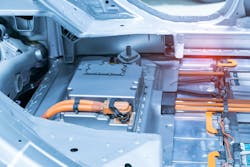EV Has a Problem: 90% of the Battery Supply Chain ‘Does Not Exist’
As the world embarks on an electric vehicle (EV) boom, a new report by the Coalition for a Prosperous America (CPA) highlights a serious challenge facing the United States—an EV battery crisis. There are several reasons for this, including weak investment in advanced technologies, limited access to critical minerals and a lack of federal policies to promote R&D and manufacturing.
An adequate supply chain for lithium-ion batteries—the single most important component in the EV—simply doesn’t exist. While some of America's automotive companies are making an effort to build their own supply chain, others continue to rely on production-outsourcing and importing. In response, the auto industry needs to step up its efforts—and its investment dollars. And Congress must implement a strategy to stimulate domestic battery production, including cost-effective and environmentally safe mining of critical minerals here in the United States.
The EV battery problem is now serious enough that Rivian CEO RJ Scaringe recently warned that 90% to 95% of the battery supply chain “does not exist.” And Tesla CEO Elon Musk cautions that prices for lithium have already “gone to insane levels.”
China is the world’s leader in EV battery production—with over 12 times the output of the United States. CPA’s research found that both China and Europe will continue to outpace the U.S. in EV battery production. By 2025, China will account for 56% of global battery production; the U.S. will account for just 19%.
Right now, much of the U.S. auto industry relies on foreign-owned battery technology—and focuses mainly on final assembly of batteries instead of the more complex challenge of designing and producing battery components. This contributes only a relatively small share of the value of overall battery manufacturing. Instead, America’s EV manufacturers need to jump into technical design, including innovation, intellectual property, and the materials science of battery component manufacturing—not just the assembly.
Mining remains a key challenge, too. EV batteries require nickel, lithium, manganese, and cobalt—elements not easily accessible to American producers due to highly restrictive U.S. mining policies. As a result, the U.S. remains dependent on imports for battery production. Currently, the U.S. only has one lithium-producing mine, and still imports the majority of its lithium. Nickel is in tight supply as well due to the conflict in Ukraine—with Russia and China among the world’s largest nickel producers. The U.S. only has one operating nickel mine; it’s slated to close by 2025.
Congress must ease mining restrictions while still maintaining America’s world-leading environmental standards. But federal policy must also address China’s massive subsidies for its state-owned factories, as well as its quotas and localized content requirements. That will require a rethink of U.S. trade policy—to help domestic producers find breathing room to develop new technologies and processes.
The Biden administration should encourage the private sector to invest in U.S. battery production, and aim to meet much of America’s EV needs in five to 10 years. This could be accomplished through tax credits and other incentives for both component manufacturing and battery assembly.
America’s EV battery gap is widening. However, this challenge can pose a real opportunity for U.S. companies. It’s time for Washington to take aggressive action to stimulate the domestic mining of critical battery materials, battery component production and final battery assembly. Doing so could help America achieve greater self-sufficiency in one of the major industries of the coming decades.
Amanda Mayoral is an economist at the Coalition for a Prosperous America.
